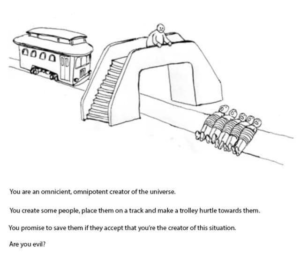
In the late 1260s, when St. Thomas Aquinas presented the strongest arguments against the existence of God in the first part of the Summa Theologiae, the first objection he offered was that if “God existed, there would be no evil discoverable; but there is evil in the world. Therefore God does not exist.” This is what’s known as the “problem of evil,” and variations of it date back to at least Epicurus (341 – 270 B.C.). In 2023, it remains one of the most common arguments against the existence of God. Some versions of the argument are stronger than others, though. Consider this meme:

At first glance, the argument might appear convincing: God sounds like the maniac from Philippa Foot’s famous “trolley problem,” who ties people to trolley tracks. But upon closer inspection, the argument is far from compelling—or even coherent.
Consider the second line: that as God, “you create some people, place them on a track and make a trolley hurtle towards them.” What does this represent, specifically?
On the one hand, you could interpret it to mean that God is evil for creating people in a world in which there’s physical pain and suffering (what’s sometimes called “natural evil”). But if that makes God “evil,”1 wouldn’t we also have to condemn all parents as evil, for bringing children into a world in which there’s pain and suffering? Even if you’re willing to take the argument to such an extreme, the rest of the argument still makes no sense: it’s simply not true (at least in this life) that believing in God spares you from pain and suffering.
So perhaps we should understand it to mean spiritual evils: that God is evil for creating a world in which there’s sin and the possibility of hell. But if this is the interpretation, it’s simply untrue that we’re “tied to the track.” The whole point of sin and damnation is that we choose it. As the Catechism of the Catholic Church puts it, “to die in mortal sin without repenting and accepting God’s merciful love means remaining separated from him for ever by our own free choice. This state of definitive self-exclusion from communion with God and the blessed is called ‘hell’” (CCC 1033). So a better analogy would be that we have placed ourselves on the track, the trolley is coming, and God is offering to move us off of the track. So will we trust him?
1As an aside, any time atheists and anti-theists use language that suggests that God is “evil,” it’s worth probing what they mean by the term. If they simply mean, “I don’t like that behavior,” it’s an uninteresting claim, since it amounts to nothing more than saying, “I don’t like what God does!” (That’s more of a self-indictment than an argument against God). On the other hand, if the argument is that there’s some kind of objective standard of morality (binding even upon God, apparently!), where is that objective moral standard coming from?

